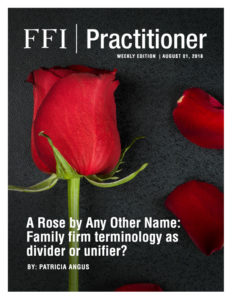
View this edition in our enhanced digital edition format with supporting visual insight and information.
Thank you to Patricia Angus of the FFI Practitioner editorial committee for kicking off a month-long series of editions relating to the theme of “Reflections.” In this week’s edition, Patricia reflects on the complexities of defining some key terminology in the field. In upcoming weeks, we’re excited to continue this reflective theme with pieces by Jamie Weiner, Ken Moores, Paul Chung and Chin Chin Koh, and an interview with Dennis Jaffe. We hope you enjoy the series!
Romeo and Juliet are the quintessential star-crossed lovers. They are drawn to each other despite all that should tear them apart. All, that is, according to their respective families, who have been feuding for generations and don’t see a good reason to end the fight. Exasperated by the way that the feud prevents their union, Juliet cries out in perhaps the most famous lines in all of Shakespeare’s works:
“Romeo, Romeo, wherefore art thou Romeo?
Deny thy father, and refuse they name…
Tis but thy name that is my enemy…
O, be some other name!
What’s in a name? That which we call a rose
By any other name would smell as sweet”1
In this classic play, it is their family names – Montague and Capulet – that ultimately doom the lives and love of Romeo and Juliet.
While maybe not as life-threatening, Romeo and Juliet would likely feel a similarity in the way that the terminology used in the field of family enterprise often serves to divide rather than unite families and advisers alike. In some cases, the division comes from feuds over who gets to decide terminology, in others it comes from disagreements about which term is the most accurate. In almost all cases, the reality is that the issues are so complex that they defy simple naming.
How can these feuds be put to an end? While that might not be possible, there are some things that can be done. First, it would help to identify the most commonly used terminology, then explore how terms are used, and finally think about ways to avoid further divisions around their usage.
Common Terms
There are so many terms that are used, misused, and confused when it comes to family firms. Indeed, there are several efforts now underway to collect and define the most commonly used terms. Further, the definition of “success” for family and/or business and the identification of the “most important” issues are used in so many different ways as to defy simple definition, much less common agreement on meaning. Each new article or usage of a term seems to create a new thread of possible interpretations. It is no wonder that the terms can often serve to divide, rather than unite. Here are a few of these key words:
- Family
- Family Business
- Family Enterprise
- Family Office
- Family Wealth
Focusing on What Lies Within
Juliet knew that a rose is a rose whatever it’s called. It’s what’s inside that counts. Similarly, with family firm terminology there is an essence that might be obscured by language. Here are some examples:
Family— In the days of the Montagues and Capulets, it was pretty easy to define a family. A family consisted of descendants of a single set of ancestors who had grown through marriage and birth across generations. Today, “family” is far more complicated. Blended marriages, divorce, legal partnerships, long-term relationships, and child-bearing with or without partners have greatly expanded the notion of family. While some cultures might stick to a more traditional definition, in most parts of the world a family is often interpreted as existing primarily where one believes it exists.
Family Business— The number of widely used and accepted definitions of a family business easily number in the double digits. In the early days of the field, family involvement in management was considered essential. Over time, ownership and control have been considered so essential that a family business might not have any family members in management. Finance researchers pick a variety of ownership percentages as a heuristic to assume family control, such as 20% or simple majority. This research recognizes the reality that family businesses include some of the world’s largest publicly traded companies as well as traditional “mom and pop” shops.2 Understanding that numbers alone fall short of defining the essence, Chua et al have proposed defining family business by behavior.3 There are some good discussions going on in the literature about this term. At the same time, in public parlance, family business usually refers to a small, private company owned by a single, traditionally defined family.
Family Enterprise— Things get more interesting when the term “family enterprise” is used. For some, it means a family that owns or controls a number of businesses, perhaps in one or more holding companies or coordinated through a family office. Enterprise connotes a certain degree of complexity and is used to reflect the notion that a single family (however defined) often grows beyond having a single business fairly quickly into a variety of holdings and joint endeavors. It often includes investment and philanthropic endeavors as well. Yet, family enterprise and family business can be used interchangeably which makes this a distinction without a difference.
Family Office— This is a term that, today, can mean almost anything. Traditionally, a family office was the central organization owned by a single family that handled tax, investment, shareholding, and related issues. Over time, the term “multi-family office” arose to cover family offices that were either jointly owned by multiple families for their own use or to denote a financial firm seeking to deliver more than investment services to outside clients. Today, the term often means the investment office of a single family or a division within a financial services firm, often without comprehensive services. It is an understatement to say there is some confusion in the use of this term.
Family Wealth— And, finally, the most confusing term of all. “Wealth” – which at its origins referred to one’s well-being – is often used synonymously with money and financial resources. This is unfortunate for all involved, as Romeo and Juliet certainly knew. Their love made them far richer than all the financial resources their families could accumulate. As a word, wealth has been diminished over time in concept and usage, especially when it refers to family wealth. And, while many today encourage the family to think about multiple “capitals” and to develop family governance4 in support of the family’s complex wealth, its distillation to mere financial issues is most common, belying the profound questions of one’s well-being at its core.5
Some Recommendations
It falls upon adviser and family alike to strive to be more clear and intentional in the terminology used with respect to such complex issues and concepts. Just as a well-intentioned family enterprise consultant to the Montagues or Capulets would have called the respective family together to help them understand that their longstanding feud was going to harm, not help, their families, so too must advisers and family members today highlight the risk of misuse and the joys of finding common definitions that best serve each specific family and situation.
Here are some thoughts on how to do that:
- Ask the family to define family business, wealth, etc. for itself. Use their own words.
- Define each term upfront – at the beginning of an article, or meeting, or discussion – so that others understand what you mean. Solicit others’ interpretations as well.
- In your definition, focus on the essential components and try to avoid over-simplifying. For example, in defining a “family business,” be clear about what mix of family, ownership, and management aspects that you include.
- Encourage open dialogue about whether and why the term matters. Perhaps the term itself is less important than agreement on the essential components under discussion.
- Think about why the use of terminology matters to the family, your consulting practice, and/ or to society. For example, by using the terms “Patriarch” and “Matriarch” you may be perpetuating out-of-date notions about power, control, and gender. Similarly, by defaulting to “G1,” “G2,” “G3” etc. you are defining family members by the actions of someone who may be long deceased, which may harm the individuality of the persons alive and in the room.
Juliet beseeched Romeo to throw off the words that didn’t match the essence that lies within each individual. Perhaps advisers and families can also try to use language that focuses on the sweet smell within and prevent unnecessary feuds in the future.
References
1 William Shakespeare, “Romeo and Juliet,” Art II Scene II.
2 See St. Gallen index
3 Chua et al, “Defining Family Business by Behavior,” Entrepreneurship Theory and Practice 1999.
4 Family governance is also a term that is often used inconsistently and inaccurately. See, Angus, Patricia M., “The Family Governance Pyramid: From Principles to Practice.” Journal of Wealth Management. 2005.
5 See Angus, Patricia M., “Are You Wealthy?”
About the contributors
 Patricia Angus JD, MIA, TEP, is founder and CEO of Angus Advisory Group LLC and an adjunct professor, and founding director of the Family Business Program, at Columbia University. She is the author of The Trustee Primer: A Guide for Personal Trustees and writes the Building Bridges column on www.wealthmanagement.com. A member of the FFI Practitioner Editorial Committee and an FFI Global Education Network (GEN) faculty member, Patricia can be reached at patricia@angusadvisorygroup.com.
Patricia Angus JD, MIA, TEP, is founder and CEO of Angus Advisory Group LLC and an adjunct professor, and founding director of the Family Business Program, at Columbia University. She is the author of The Trustee Primer: A Guide for Personal Trustees and writes the Building Bridges column on www.wealthmanagement.com. A member of the FFI Practitioner Editorial Committee and an FFI Global Education Network (GEN) faculty member, Patricia can be reached at patricia@angusadvisorygroup.com.
About Angus Advisory Group
Angus Advisory Group LLC consults to individuals, families, and organizations on family wealth, business, philanthropy, and related issues.

View this edition in our enhanced digital edition format with supporting visual insight and information.





